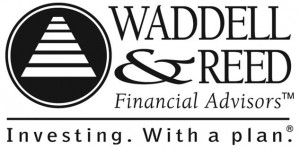Submitted by Jordan Mahoney, Financial Advisor with Waddell & Reed, Inc.

Most of us recognize the importance of financial responsibility, but if we’re honest, many of us really don’t know where to start.
If you’re like me, nobody took you aside in high school and taught you how to open a retirement account or when and how much to fund it. When you got your first job, no one told you how much to build up for cash reserve in case of emergency, or how much life insurance you might need. If we’re really honest with ourselves, most of us weren’t even taught how to balance a checkbook or keep a simple budget.
Money management is just not something we talk openly about in our culture. For example, would you be comfortable asking a friend what’s in their bank account? How about asking your boss about his annual salary? Could you ask your parents what kind of life insurance they have? Most of us wouldn’t. We’ve been told it’s rude. And maybe it is. But it’s also important to be able to be honest about your situation and to ask for guidance when you need it.
Now, I’m not saying that everyone ought to shout our checking account balance from the rooftops. But I am saying that if we want to set ourselves up for financial success and independence, we need to start getting comfortable with the conversation. We can’t let our fear of this dialogue keep people from making decisions as important and life altering as these.
I think it’s fair to say that everyone knows of someone who didn’t make it to financial success, particularly in retirement. Maybe they got sick, for example, and were forced into retirement before they were financially prepared. Maybe they’re still healthy but are living off of state assistance or with their children or grandchildren because they didn’t save up enough to be independent. These are common stories.
Think about the people that you may know of that have had the opposite experience. They aren’t living paycheck to paycheck. They aren’t living with their parents. They can go where they want, when they want. They may even be able to afford to contribute to various charitable causes and leave a legacy or some form of inheritance for their children and grandchildren. How did they get there? Chances are, they didn’t win the lottery at age 45 (but kudos if they did!). They most likely spent their money frugally, saved adequately, invested wisely, and had a plan.
At some point, these folks sat down, either on their own or with a professional, and hashed out the details. What money is coming in versus going out? What can be saved or ought to be cut back? What is it going to cost to accomplish short and long term goals? How long will it take to accomplish those goals? What’s the most effective way to insure against untimely illness, injury or death? A hundred small questions that all start at the same place: What is important about money to you?
There are many different ways to save money and even more ways to invest it. What’s important is finding out which of those are best suited toward pursuing YOUR goals. Your financial plan should be just as unique as you are, and it can involve a myriad of different moving parts and strategies, but it should always start with that same question.
Now, it’s never too late to improve your situation, but young folks today have a huge opportunity to dramatically change their futures and they are missing it because no one takes the time to mentor them and teach them sound strategies in money management. That is absolutely tragic, in my opinion.
Let’s have that conversation. Let’s make a plan. Let’s change your future. What’s important about money to you?
 This article is meant to be general in nature and should not be construed as investment or financial advice related to your personal situation. Please consult your financial advisor prior to making financial decisions. Investing involves risk and the potential to lose principal.
This article is meant to be general in nature and should not be construed as investment or financial advice related to your personal situation. Please consult your financial advisor prior to making financial decisions. Investing involves risk and the potential to lose principal.
Jordan Mahoney is a Financial Advisor with Waddell & Reed and is licensed to offer securities and insurance in Washington state. She can be reached at 360-734-4728 ext.: 123. Securities are offered through Waddell & Reed, Inc., Member FINRA and SIPC. Insurance products are offered through insurance companies with which Waddell & Reed has sales arrangements. (05/14) For more information, click here.









































